The $5 billion bargain and the 'test' of the US-South Korea alliance
(Baonghean) - For the first time in the 66-year history of maintaining an alliance, the US and South Korea have publicly disagreed on the issue of sharing defense costs. Although not a strategic issue, this disagreement may affect the future of cooperation between the two countries, at least under US President Donald Trump.
The bargain failed
The US-South Korea negotiations on defense cost sharing have been underway for a long time. The US wants South Korea to be a model for further negotiations on cost sharing with other allies, such as in Europe. However, the negotiations that Washington has been looking forward to have have not had the satisfactory results as expected. The meeting was initially arranged for 1 day for the parties to negotiate and find a unified solution, but after just over an hour of discussion, the US delegation "left" because "the South Korean side did not meet the request for a fair sharing of the burden of security costs".
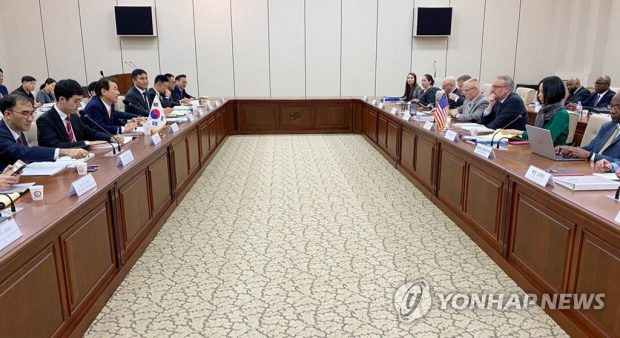 |
| South Korean and US officials attend defense cost-sharing talks in Seoul on November 18, 2019. Photo: Yonhap |
Specifically, Washington wants Seoul to contribute $5 billion per year to maintain more than 28,000 US troops in South Korea. This amount is five times the amount the South Korean government currently contributes to the US. It is unclear what the "new items" that the US side is demanding to increase costs are. But according to Yonhap, this item will include personnel costs for US soldiers in South Korea, costs to support soldiers and their families, costs for rotating US troops on the Korean peninsula and costs for overseas training...
In fact, it is difficult to accurately estimate whether the figure of 5 billion USD is a “balanced” fee or not. The South Korean side said that they are willing to pay more money for the US to maintain its military presence and ensure its security, but within an “acceptable level” and 5 billion USD is too high. Meanwhile, the US Secretary of Defense has the opinion that “South Korea is a rich country, can and should pay more” for maintaining US troops in this country.
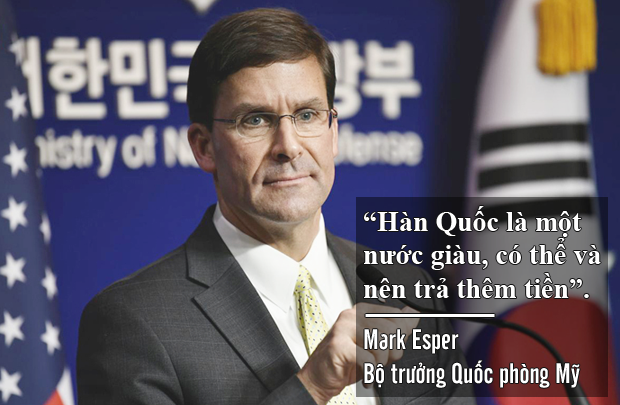 |
| Photo: Reuters |
Although not publicly stated, it seems that both the US and South Korea are looking for “reasons” for their own demands and requests. The US believes that its military presence in South Korea will help Seoul deal with the “threat” from neighboring North Korea. If the budget is not increased, the US will withdraw its troops and that will not affect US security, but for South Korea, it is “a life-or-death situation” because theoretically South Korea and North Korea are still in a state of war. However, South Korea believes that inter-Korean relations are warming up, and direct threats from its northern neighbor have somewhat eased. In addition, the majority of people in the country oppose increasing military spending for the US, which forces the Seoul government to consider the pros and cons.
Where is the value of alliance?
From both sides, the failure of the defense cost negotiations has disappointed both South Korea and the US. For the US, President Donald Trump has long maintained that “the US is not a global policeman”, and any country that wants to be protected by Washington must “pay”. The US is expected to begin negotiations to re-share defense costs with Japan, Germany and NATO in 2020. South Korea is the first “test” partner of the Trump administration on this issue. Therefore, this failure will have a major impact on Washington’s plans because “if the beginning is not good, the end will be difficult to achieve”.
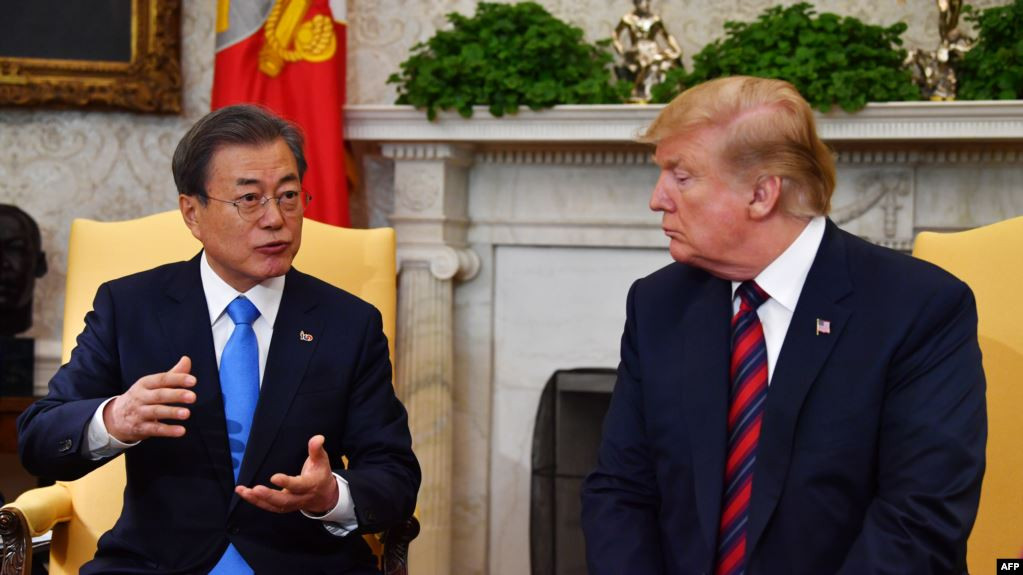 |
| US President Donald Trump and his South Korean counterpart Moon Jae In. Photo: AFP |
The remaining US partners will certainly monitor President Trump's "behavior" with South Korea to make appropriate preparations.
Previously, Mr. Trump hinted that he might withdraw US troops if South Korea did not agree to share the security burden. If the US carries out its threat, it will create a major rift in the US-South Korea alliance, deeply affecting Washington's foreign and security policy in Northeast Asia. Meanwhile, if negotiations with Seoul continue without results, the US will find it difficult to have the "prestige" to enter into negotiations on similar topics with other allies.
As for South Korea, the current US administration’s somewhat “excessive” demand for defense cost sharing will cause the country to question its nearly seven-decade alliance with Washington. The controversy over the cost of contributing to the US military stationed in South Korea has sparked heated debate in the country’s parliament. A group of South Korean activists said the US demand was “unreasonable” and called for a large reduction or even withdrawal of US troops.
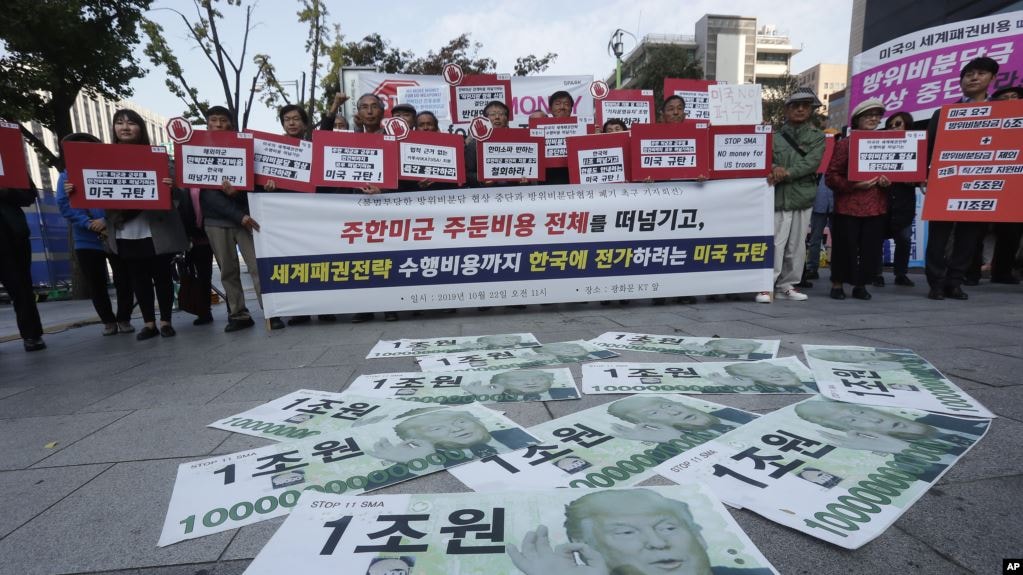 |
| Counterfeit bills with the image of US President Donald Trump are displayed on the street while protesters gather near the US Embassy in Seoul to protest against US demands that Seoul increase spending to host US troops there. Photo: AP |
This group believes that the US forces in South Korea are also for their benefit to contain Russia and China, not just to ensure security for Seoul. A South Korean official did not hesitate to ask the question, "Has the US become a mercenary? Is this a business deal?" Although each side has its own arguments for its point of view, the recent failure of the US-South Korea negotiations will certainly have a negative impact on this alliance relationship in the context that the US and South Korea both need each other to resolve the common issue, which is the nuclear issue on the Korean peninsula.
It can be said that the principle of “reciprocity” is completely normal in international relations, but the US asking its allies to pay more for security guarantees seems to affect the prestige and global role of this country. And in fact, from this move, Washington’s allies are questioning whether the US measures the “value of allies” in money?!
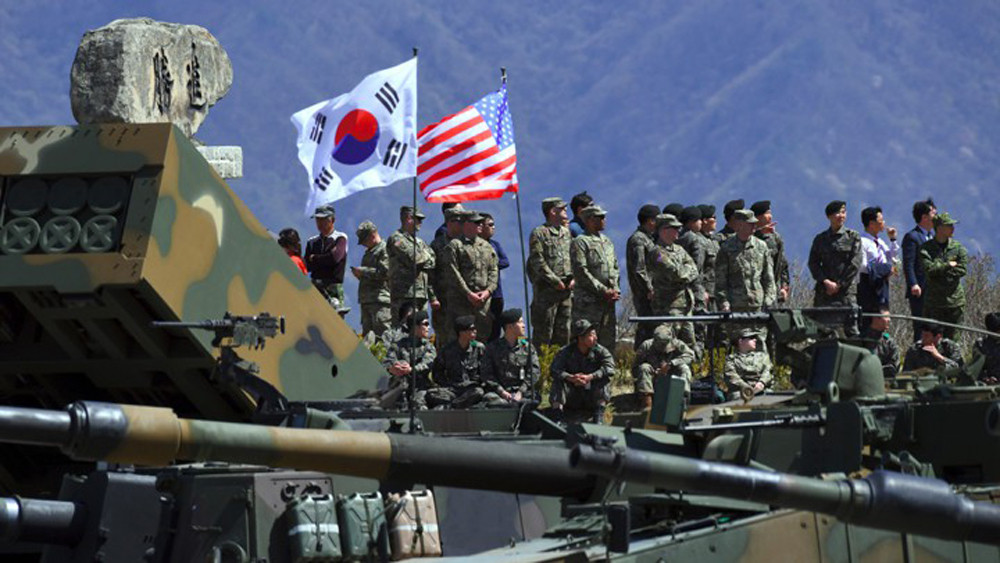 |
| US and South Korean troops participate in a joint exercise. Photo: AFP |

